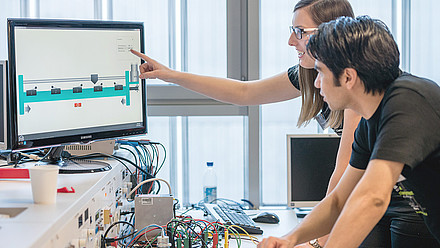Image and signal processing affect our daily lives in an ever-increasing way. Participate in designing this fascinating technology and shape its future function in business and society using AI empowered algorithms and methodology. Today‘s networked devices for image and signal generation provide a historically unmatched volume of raw data for automated decision making and control systems. The master programme Applied Image and Signal Processing enables you to design and implement professional data driven solutions in a range of exciting application areas.
| Study mode: | full-time |
|---|---|
| Degree awarded: | Master of Science in Engineering (MSc) |
| Length of study: | 4 semesters |
| Study places per year: | 20 |
| Location: | Salzburg University of Applied Sciences (Campus Urstein) and University of Salzburg (Campus Techno-Z) |
| Language of instruction: | English |
| Tuition: | tuition fee at least € 363,- per semester (up to double amount for NON-EU countries) + Euro 25.20 student union fee per semester |
We'd like to point out that after activation data may be sent to third parties. Further information can be found in our
privacy statement.
Why study Applied Image and Signal Processing at Salzburg University of Applied Sciences?

Based on prior bachelor studies, the joint master programme for Applied Image and Signal Processing offers you thorough technical training at the cutting edge of research. With an unprecedented amount of raw data being generated by networked devices for image and signal generation, it has become vital to develop new tools and software programmes to distil useful information.
This master programme prepares you with an advanced ability for modelling, problem solving and optimisation. It familiarises you with formal and methodical basics as well as with diverse fields of application. Highly research-oriented courses and small groups provide an appropriate setting for creating innovative approaches and creative ideas.
Among other topics, you will learn about:
- artificial intelligence
- mathematical models and algorithms
- geometric modelling
- audio processing
- digital media formats
- IT project management skills
What you should know about the Applied Image and Signal Processing master programme

State of the Art Methodology
The master programme for Applied Image and Signal Processing provides you with a high degree of specialisation. The first year is devoted to a concise study of the theoretical foundations, the mathematical models and the algorithms used in image and signal processing. Those are complemented by an introduction to data science and machine learning, statistics, audio processing, digital media formats, and, in the third semester, computer vision and geometric modelling.
Choose your Elective Courses
Starting with the second year, specific application scenarios are discussed and corresponding technologies are investigated in a number of elective courses. Choose two such courses and complement those by free electives with a total sum of 6 ECTS in the 3rd or 4th semester.
Good to know: While it is recommended to take a third course from the electives, other lectures given in English on one of the two universities also qualify as free electives.
Develop your own Ideas
In the third semester, you also start researching on your master thesis. You will acquire profound skills in scientific research and paper writing as well as in agile project management. The fourth semester, finally, is dedicated to the completion of the master thesis. The accompanying master seminar provides a forum for presenting and defending one‘s approach to a solution and the results obtained, i.e. for scientific discourse with faculty and peers.
Electives

As part of your degree specialisation, you can choose from the following elective courses at two universities:
| Salzburg University of Applied Sciences | Paris Lodron University of Salzburg |
|---|---|
|
|
Studying abroad
With English as the language of instruction, the master programme has a highly international outlook. To complement your studies in Austria, you can choose to do a semester abroad at one of our numerous partner universities in the fourth semester.
Career prospects
This master programme is designed to provide you with an in-depth professional and scientific training based on research driven teaching. The sound knowledge and skills acquired qualify the alumni for diverse practical challenges in their professional work and empower them to contribute to future innovations in image and signal processing based on artificial intelligence. A lot of interesting research and development projects in the private and the public sectors are calling for your expertise. Alternatively, this degree will open up career tracks in universities and research labs by qualifying for applying to PhD programmes.
